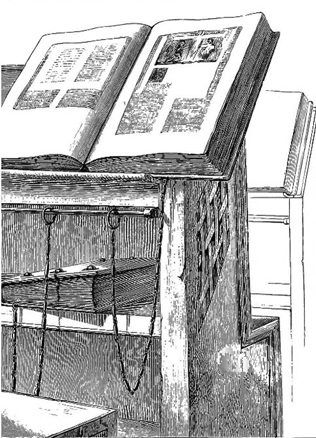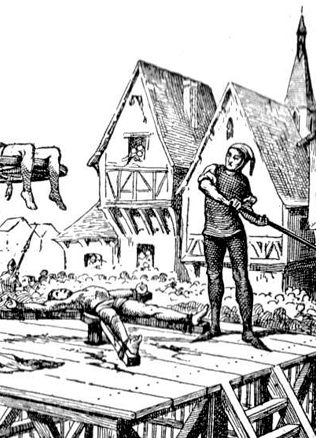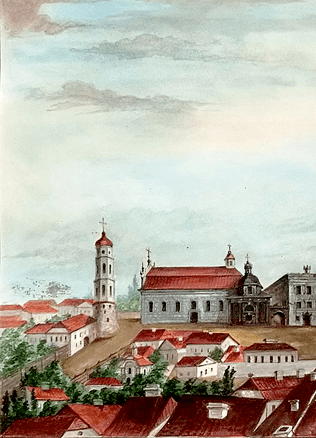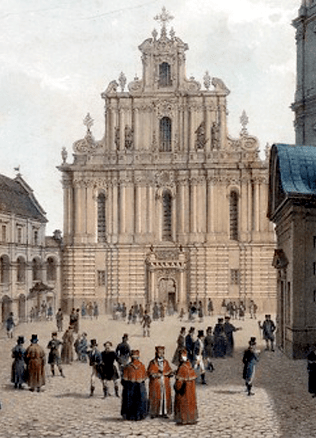Non-Renaissance Postilla, not written by Daukša
In 1599, Vilnius Academy printing-house printed the largest literary work of all the books published in the Lithuanian language in the 16th century, including the publications of Lithuania Minor. This book is referred to as the Postilla by Mikalojus Daukša, even though its original heading says the following: Postilla Catholicka, <…> retold from Polish by priest Mikalojus Daukša, canon from Medininkai. In the Latin foreword-dedication to Merkelis Giedraitis, priest Mikalojus Daukša makes the following reference to the source of translation: these are “interpretations of the Holy Gospel” (homilies), studiously prepared by “the most educated and religious man Wujek.” This individual is well known by historians of literature, culture and religion. Jakub Wujek,(1541–1597) was a Polish Catholic priest, a Jesuit, Doctor of Theology, an ardent supporter of Counter Reformation, for his literary accomplishments called the Polish Cicero. After the Ecumenical Council of Trent, Catholic Church regarded preaching as a particularly effective way of combating Protestantism. It urgently needed new, persuasively and competently written sets of sermons. Jakub Wujek created even two postillas – Postilla Catholicka (1573) and Postylla mniejsza (Lesser Postilla); I part. 1579, II part. 1580). The latter was more popular. Actually, this was the Postilla translated by the Samogitian Canon Mikalojus Daukša. As shown by the quoted words from the foreword, he never even thought of claiming Postilla’s authorship. It is highly probable, though, that the priest, known to have been an active proponent of Counter Reformation, held the same views as Jakub Wujek’s and sought to disseminate the ideas in his native language. But did he really approve of these ideas? This could be a debatable question.
Exemplary priest
One of the greatest living authorities for Mikalojus Daukša was his patron and direct superior, Bishop of Samogitia Merkelis Giedraitis. The Bishop, coming from an old and influential family of dukes, was a supporter of the Lithuanian political and cultural autonomy. As a young person, Merkelis Giedraitis studied even in several German universities. His study advisor and supervisor was Jurgis Zablockis, one of Martynas Mažvydas predecessors. Having become a Catholic Bishop (1576), Merkelis Giedraitis supported in his environment the spirit of tolerance, which prevailed in Lithuania in the third quarter of the 16th century. There is historical evidence testifying that Mikalojus Daukša was also willingly cooperating with Evangelists (quite likely, he was born in Babėnai near the town of Kėdainiai, which from the mid-16th century was a Protestant town). Judging by the particularities of translation performed by Mikalojus Daukša, one might speculate that he must have read the books written by Lutherans from Lithuania Minor (books by Martynas Mažvydas, Baltramiejus Vilentas, possibly by Jonas Bretkūnas as well).
Researchers claim that Mikalojus Daukša was a broad-minded person, holding liberal views. In short, he was a representative of Renaissance culture.
There are two historical sources providing information on Daukša’s personality. The first is the records of the visitation of the Samogitian diocese, compiled in 1579. The visitator Tarquinia Peculus visited the parishes, checked the churches, interviewed the parsons and vicars. After the visitation, the only priest who did not receive any reproach on moral grounds was the parson of Krakiai Mikalojus Daukša (who by that time had been appointed canon and therefore slightly neglecting his parish), he was the only one wearing a priest’s garments every day and a tonsure (the practice followed by Catholic priests of cutting or shaving some or all of the hair on the scalp). It was only in his parsonage that the visitator found a library with a numerous collection of worthy “scholarly books, good enough, and Catholic,” with the exception of three books, included into the list of books banned by the Catholic Church. Mikalojus Daukša was ordered to either burn or destroy these books by tearing them, or “deliver them to the Jesuits for appropriate corrections.” The fact that the Samogitian canon made no effort to hide these books, knowing well in advance about the forthcoming visitation, testifies to the priest’s principles.
A Renaissance foreword to the Baroque Postilla
The second source of information about Mikalojus Daukša is Postilla’s “Foreword to the Benevolent Reader” written in Polish. In it, an unexpectedly new and innovative definition of a nation was formulated and a model of the Lithuanian culture based on the native language was provided. Trying to prove the statement that the Lithuanian language should be granted the same rights in Lithuania as the Polish language has in Poland, Daukša uses Renaissance arguments, based on practical experience, observations of nature, knowledge of history and a consistent, rational logic.
For comparison sake, in Jakub Wujek’s sermons the only Renaissance-like feature is the style of narrating. The thoughts themselves and the system of values aimed at the readers or the listeners, as well as word outlook, though, are already Baroque like. Instead of talking about the love of God, Jakub Wujek preaches of the fear of God. His God is a wrathful and vengeful God of the Old Testament. His sermons are permeated with such motives as human squalor, suffering, repentance and humility, he also talks of the brevity of earthly life and deplorable impermanence of all matter. The preacher seeks to affect not the mind of his audience but their feelings and imagination (he gives a detailed description of how horrible the end of the world will be when the heavens and the earth “will start to break up and collapse.” This is a clear manifestation of Baroque aesthetics. Wujek sees nothing valuable during one’s earthly life and does not recognize the joys of this life. The body is regarded by him merely as a source of temptation and a sin vessel, therefore it should not be protected or taken care of. After all, after death our body will inevitably turn into “stench, rot and filth among worms.” According to him, a human corpse is no different from a dog’s carcass rotting in the scrap-heap.
An approach to death is perhaps the most obvious divide between the Renaissance and Baroque outlook.
A Baroque imperative of memento mori permeating the Postilla by Jakub Wujek had to be alien to Mikalojus Daukša. Furthermore, the Polish preacher is known to have more than once angrily assaulted the Protestants and talked about them with open hatred, using different contexts for expressing his views.
One can conclude with a well-grounded assumption that Mikalojus Daukša hardly chose this set of sermons (which he might have preferred to use as a priest) for translation. In all likelihood, this was the decision of his ecclesiastical superiors. It is highly probable that if the Samogitian priest had been entrusted with the task to create sermons independently, the outcome would have been different. That being said, Mikalojus Daukša’s merit as a translator should be properly assessed. He succeeded in coining great neologisms and took upon his shoulders the task hardly manageable by one person. This notwithstanding, the Lithuanian edition of Jakub Wujek’s Postylla mniejsza (Lesser Postilla) could only relatively be regarded as Postilla by Daukša. It is not the Postilla but its Foreword to the Benevolent Reader that should be regarded as a particularly significant text of the Lithuanian Renaissance humanism.
Eglė Patiejūnienė



